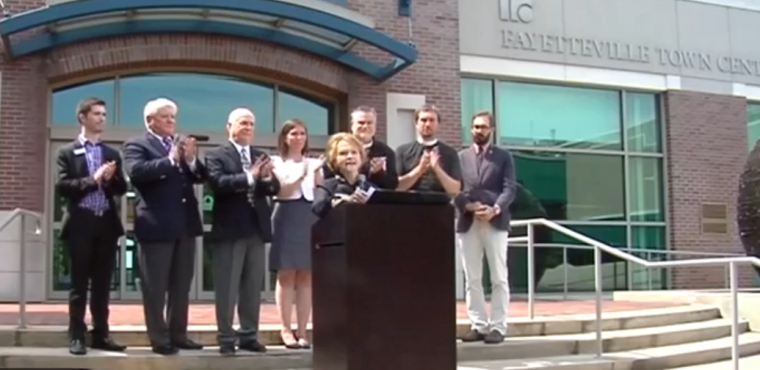In a reversal from last year, Fayetteville barely ratifies LGBT anti-discrimination act

FAYETTEVILLE, Ark. (Christian Examiner) – In a special election Sept. 8, the voters of Fayetteville were asked again to cast their ballots on the matter of the Uniform Civil Rights Protection ordinance (Ordinance No. 5781), which prevents discrimination on the basis of sexual orientation and gender identity, and the ordinance passed by a slim margin.
In an almost exact reversal from their position on a similar ordinance last December, 52.8 percent of voters ratified the ordinance, while 47.2 percent voted against. The difference was about 800 votes.
Throughout its development, the ordinance has been hotly debated by the For Fayetteville group supporting the law and the Protect Fayetteville group against it, according to the Northwest Arkansas Democrat-Gazette.
Critics warn the ordinance could open the door for a new protected class. Arkansas's Intrastate Commerce Improvement Act, also called Act 137, prohibits towns from making laws that create protected classes or prohibit discrimination on a basis other than the criteria contained in the Arkansas constitution.
UNCONSTITUTIONAL
A main argument of the Protect Fayetteville position is that the ordinance violates Act 137, a position with which Arkansas Attorney General Leslie Rutledge agrees.
The ordinance also provides for the creation of a Civil Rights Commission appointed by the City Council to review complaints, which Protect Fayetteville fears is unconstitutional since the commission would operate outside of due process.
According to the ordinance, the seven-member commission will consist of two representatives of the business community, two owners or managers of rental property, one human resources or employment law expert, and two Fayetteville residents, at least one of whom must identify as gay, lesbian, bisexual or transgender.
According to Protect Fayetteville's website, the commission is biased by definition. "The commission is biased at its inception requiring that at least one openly gay individual serve on the tribunal," they said. "No other criteria for being appointed to the commission is mentioned."
Protect Fayetteville has filed a lawsuit seeking to invalidate the newly ratified law.
City Attorney Kit Williams, who was instrumental in drafting the ordinance, claims the new law is needed since the Arkansas Civil Rights Act of 1993 does not specifically prohibit discrimination based on sexual orientation or gender identity, although these criteria are referenced in other legislation.
"The protected classifications are certainly there in [other] state law, and, therefore, this is not a new protected classification," Williams said.
MISLEADING
Ron Lomax, missions director for the Washington Madison Baptist Association in Fayetteville, said media coverage misled Fayetteville voters by claiming the ordinance was attempting to strengthen and protect its citizens' civil rights, according to Baptist Press.
"It has nothing to do with civil rights. It is strictly a special entitlement for gay and lesbian groups. It actually discriminates against people of faith," Lomax said.
The Uniform Civil Rights Protection ordinance special election was held only nine months after another nearly identical election about the Civil Rights Administration ordinance was conducted in Dec. of last year.
Some citizens questioned why they needed to vote again on a matter they feel they already decided.
The intent of the previous ordinance was the same: to offer equal rights protection to citizens regardless of sexual orientation or gender identity--but some language used, such as "perceived" characteristics and "socioeconomic background," was widely regarded as overly ambiguous.
Voter Charlie Gilbeau said compared with the Civil Rights Administration ordinance, the language of the present referendum was more straightforward.
In Dec., voters were asked to vote for or against repeal rather than for or against ratification and, according to Gilbeau, "was obviously worded in an attempt for confusion."
The Uniform Civil Rights Protection ordinance is a new draft of the same laws.
Violations of the Uniform Civil Rights Protection ordinance would result in a fine, not necessarily a criminal charge. Initial violations would be $100, and subsequent violations $500.
Case law suggests that anti-discrimination ordinances are unenforceable and violate extant state laws.
The fate of the new ordinance remains uncertain as the lawsuit questioning its constitutionality does not have a court date yet for argument.